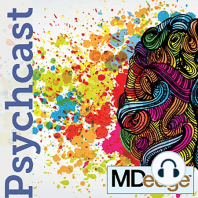12 min listen

Recognizing medical symptoms that can mimic psychiatric diagnoses with Dr. Richa Bhatia
FromPsychcast
Recognizing medical symptoms that can mimic psychiatric diagnoses with Dr. Richa Bhatia
FromPsychcast
ratings:
Length:
18 minutes
Released:
Dec 16, 2020
Format:
Podcast episode
Description
Richa Bhatia, MD, conducts a Masterclass on how to identify medical and neurologic illnesses that present with psychiatric symptoms and mimic psychiatric diagnoses. Dr. Bhatia is a board-certified general and child and adolescent psychiatrist in private practice. She has no disclosures. Take-home points Psychiatric diagnoses are diagnoses of exclusion. Psychiatric clinicians must maintain a high level of clinical suspicion for medical and neurologic illnesses that present with psychiatric symptoms and mimic psychiatric diagnoses. When patients have a “strange” presentation of their psychiatric illness, including being out of the usual age range, a fast progression, or an unusual constellation of symptoms, clinicians should pursue a medical work-up and think broadly about other diagnoses that might mimic the psychiatric diagnosis. Dr. Bhatia provides an overview of common medical and neurologic illnesses that mimic psychiatric diagnoses, including hypothyroidism, delirium, HIV/AIDS, Addison disease, autoimmune encephalitis, temporal lobe epilepsy, frontotemporal dementia, Wilson’s disease, and Parkinson’s disease. Summary Hypothyroidism is an endocrine disease that can mimic depression. The physical symptoms include constipation, edema, dry skin, hair loss, weight gain, and cold intolerance. Individuals with comorbid hypothyroidism and depression report inadequate response to antidepressants, so psychiatrists should check the patient’s thyroid-stimulating hormone or refer them to their primary care physician if they suspect hypothyroidism with elevated TSH. Delirium is a common yet underdiagnosed syndrome that occurs secondary to medical illness and can produce an array of neuropsychiatric symptoms, including psychosis, irritability, and disorganized behaviors, which can lead to misdiagnosis as schizophrenia or mania. Delirium presents as an abrupt change in cognition with disorientation and significantly impaired attention. Hypoactive delirium presents with lethargy, apathy, and decreased alertness, and is often mistaken for depression in the hospital setting. Simple beside tests such as the Confusion Assessment Method can be used to quickly aid in diagnosing delirium. HIV/AIDS can mimic psychiatric disease through direct effect on the nervous system, opportunistic disease, intracranial tumors, cerebral vascular disease, and medication adverse effects. HIV can mimic depression by causing neurovegetative symptoms; apathy, psychomotor slowing, and working memory deficits are more characteristic of the neuropsychiatric impairment from HIV rather than a primary depressive disorder. In late-stage HIV/AIDS, dementia can cause bizarre behaviors, delusions, and mood disturbance such as euphoria and irritability. Addison disease is characterized by low blood pressure, hyperpigmentation, nausea, vomiting, weakness, fatigue, hypokalemia, and hyponatremia. Addisonian crisis can present with neuropsychiatric symptoms of delirium, anxiety, agitation, cognitive impairment, and auditory and visual hallucinations. Autoimmune encephalitis, with anti–N-methyl-D-aspartate receptor encephalitis as the most common type, often masquerades as a primary psychotic symptom. Notable symptoms include subacute onset with fast progression and no clear prodrome, working memory impairment, agitation, or lethargy. Other presenting symptoms include focal neurologic deficits, new-onset or rapidly developing catatonia, fever, headaches, flu-like illness, and autonomic disturbance. Temporal lobe epilepsy also can mimic a primary psychiatric disorder. The symptoms of seizure-like staring, blinking, lip-smacking, and behavioral arrest are precipitated by a sensation of fear or epigastric sensation and depersonalization, which can lead to misdiagnosis as a panic attack. Frontotemporal dementia (FTD) can be mistaken for a primary psychiatric diagnosis in the initial stages. Hallmark symptoms include progressive behavioral change with disinhibition and a decline in ex
Released:
Dec 16, 2020
Format:
Podcast episode
Titles in the series (100)
Charles L. Raison: Ketamine and PTSD: How can ketamine or other psychedelic drugs impact some mental illnesses? by Psychcast